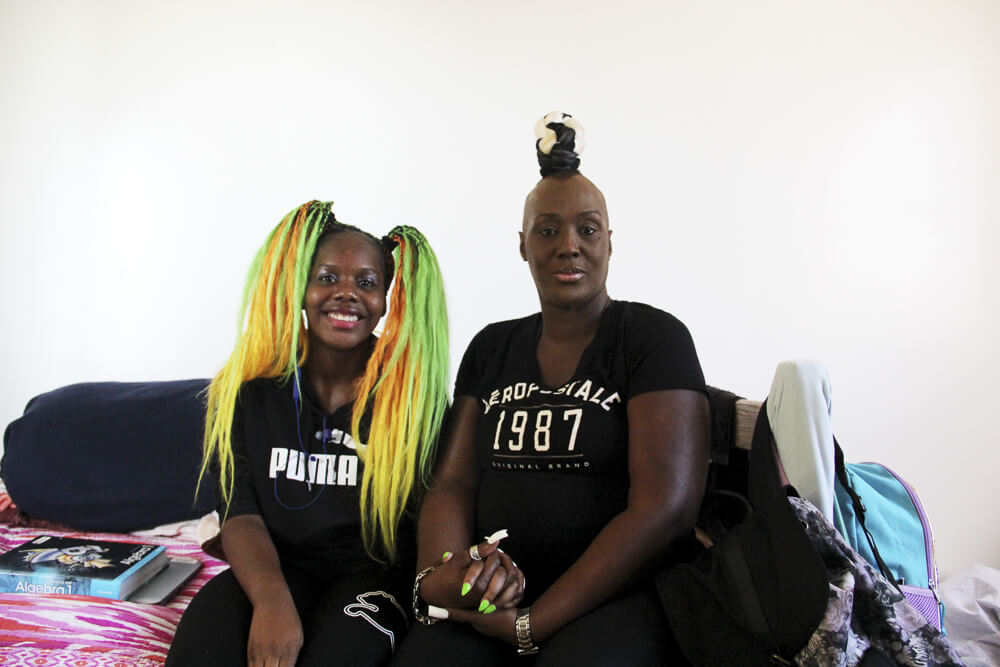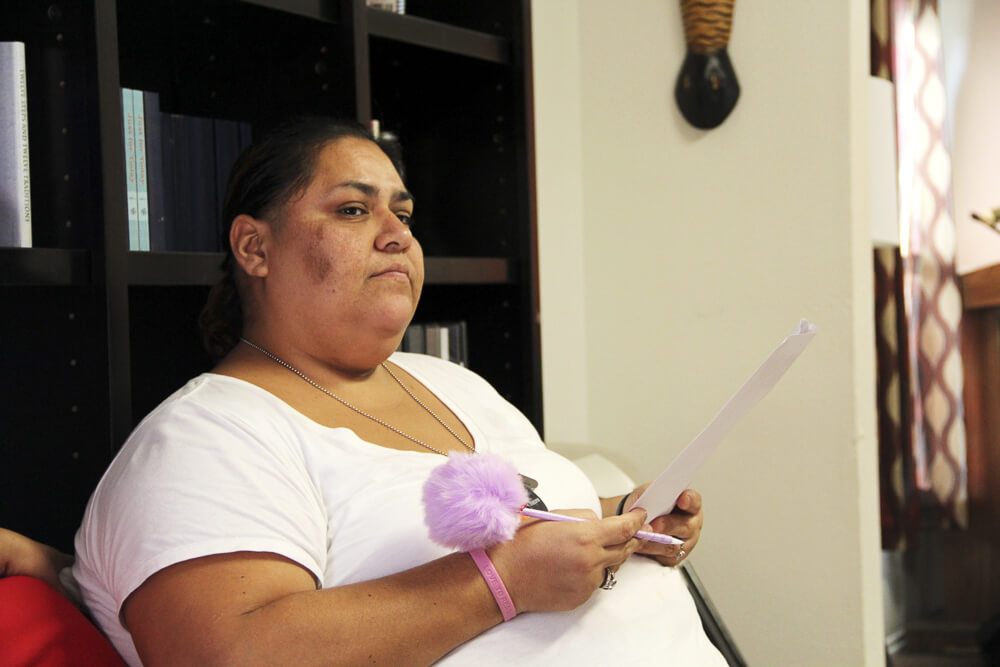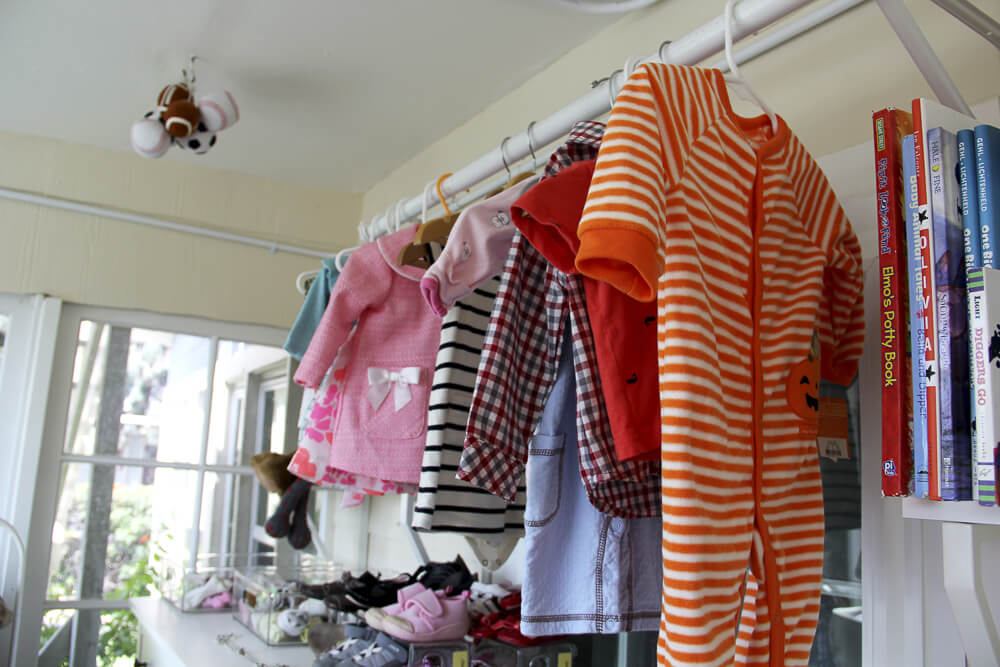For thousands of women in Los Angeles mental illness, drug abuse and housing costs intersect with the challenges of pregnancy and raising children.
When Desiree Quesada was pregnant with her third child, “home” meant a lot of things: an RV parked on a side street, a motel room, a shelter bed on Skid Row.
She had been homeless on and off for five years, but Quesada made a promise to herself that her newborn child wouldn’t spend a single night on the streets. Just before giving birth to a baby boy, she agreed to move back into an apartment with her dad.
But before she had a chance to leave the hospital, the Los Angeles County Department of Children and Family Services found Quesada — who was caught panhandling with her daughter on the side of a freeway in 2013 — unfit to support a child. They placed the baby in foster care, and he was eventually adopted.
That was five years ago, and Quesada, now 40, hasn’t seen her son since.
“I never even got to take him home,” Quesada says. On an October evening last year at the temporary shelter where she was staying in South L.A., she described how fraught family relationships and drug abuse led her to the streets, where she became pregnant three times – and lost all three kids to child protective services.
Quesada is one of the thousands of women in Los Angeles for whom mental illness, drug abuse and the high cost of housing intersect with the challenges of pregnancy and motherhood.
Los Angeles County’s emergency helpline received nearly 4,000 calls in 2017 from homeless women seeking help with their pregnancies, most of whom would have to navigate a complicated network of shelters and health clinics. Some may ultimately part with their children, who face health risks stemming from homelessness and poverty.
In the last five years, homelessness has soared in Los Angeles by 34%. At any given time, more than 53,000 people lack stable, permanent housing in Los Angeles, according to county data from 2018. By that definition, many pregnant women may be among them, says Kimberly Gutierrez, an outreach worker at the John Wesley Community Health clinic in South L.A. where Quesada was staying.
A pregnant woman might start out sleeping in her car, then crashing with a parent or friend before finally staying at a shelter or setting up a tent on the street, Gutierrez says. From alcohol and drug addiction to mental illness and domestic violence, many of these women face other problems that might lead family and friends to withdraw their support.
Sky-high Living Costs
Quesada completed a substance abuse recovery program at the John Wesley clinic last year as part of her ongoing battle to regain custody of her three youngest kids. But for many others, the lack of affordable housing in Los Angeles creates an insurmountable burden. The city-wide median asking price for a one-bedroom apartment is $2,362 – out of reach for many low-income women.
Harvest Home Director of Programs Anju Franklin says the high cost of housing is the biggest driving factor behind homelessness among expectant mothers and women with children.
“There’s a stereotype that it’s the result of substance abuse,” Franklin says, “but in my experience, that’s really not the case. If you have unstable housing your whole life growing up, it can become a part of the cycle.”
Housing costs were the main reason Tureka Baker could not find a new home for her family after she was evicted from her condo in Hesperia in 2017. She moved from hotel to hotel for the following two years, along with her husband and 14-year-old daughter. It was in one of these hotels that she found out she was pregnant in late 2018.
“There’s a stereotype that it’s the result of substance abuse, but in my experience, that’s really not the case. If you have unstable housing your whole life growing up, it can become a part of the cycle.”
Harvest Home Director of Programs Anju Franklin
Her emotions were “all over the place,” Baker says. Thoughts raced through her mind that she says would never have surfaced if she had stable housing — mainly, whether she should keep the baby, give him up for adoption or have an abortion.
Eventually, she says she came to terms with her pregnancy. Soon afterward, however, she moved into the Union Rescue Mission on Skid Row, where she began to wonder what would happen after she gave birth.
“Worry comes with the territory,” Baker says. “You want to be stable, you want your children in a safe environment. you want to go home to privacy.”
Yearning for Motherhood
Like Baker, Quesada also had doubts about having a child while she was homeless.
She was living in an RV in 2015 when she started feeling a particular kind of sickness for the fourth time – the kind she knew came with pregnancy. At first, she was upset — estranged from her teenage daughter and unable to see her two younger children in foster care, she felt like she couldn’t deal with having another child.

Struggles with homelessness and substance abuse have forced Desiree Quesada to surrender custody of her children. Photo by Diana Kruzman.
But those feelings turned to excitement as she tried on maternity dresses and picked out clothes for the baby, planning how she and her boyfriend — who had also been homeless — would take her to a real home once she was born.
“We talked about wanting to start a family together,” Quesada says. “We wanted the kids to be with us — to get an apartment, a little place.”
Though Quesada’s pregnancy was unplanned, some women choose to become pregnant despite their unstable housing situation, says Dominika Seidman, a women’s health specialist in San Francisco who often treats homeless pregnant women. She believes a lack of access to contraceptives and sex education for homeless women can drive an uptick in unintended pregnancies. But at the same time, women like Quesada still hope to start a family.
“There’s a stigma around continuing a pregnancy when you’re homeless,” Seidman says. “A large portion of [homeless] women are not using contraceptives because they wanted a pregnancy or were not interested in the methods currently available.”
Looking for Options
The Union Rescue Mission, where Baker and her family stayed during her pregnancy, is one of the few homeless shelters in Los Angeles that accepts pregnant women — a population most others avoid because of the higher costs of caring for women and children, says the mission’s CEO Andy Bales. The shelter is “a place of last resort,” Bales says, and as a result, it doesn’t place strict requirements on the women who enter its doors.
But many homeless women in L.A. County who find out they’re pregnant never see the inside of a homeless shelter. Instead, they typically call a general social services helpline that connects them with different resources, from maternity homes to domestic violence shelters to substance abuse recovery programs.
If the women have other children, they might be directed to one of eight Family Solutions Centers run by the county — where officials conduct a full assessment to determine whether they need to be sent to a shelter, into crisis housing or given motel vouchers, depending on their source of income and the length of time they’ve been homeless.
First-time mothers are generally sent to maternity homes — private facilities run by nonprofit organizations, many of which have a religious background and very little space available. As a result, their entry requirements are stringent. Women are expected to be free of drugs, working toward some form of vocation or education and, in some cases, no more than a month or two pregnant.

After being evicted from her Hesperia condo in 2017, Tureka Baker (right) struggled to find a new home for her family. Photo by Diana Kruzman.
Elizabeth House, a residential program for homeless pregnant women in Pasadena, reviews applications from nearly 400 women a year for a maximum of 18 spots, according to Director of Programs Terry Bright.
The benefits for the women who get in are extensive. Elizabeth House offers therapeutic services, lessons in infant care, job skills training, finance classes, art lessons and a scholarship fund for college or vocational training. But the program only accepts adult women whose other children are under five years old and who have been free of illegal drugs for at least six months.
Those who don’t qualify for programs like the one at Elizabeth House are referred to one of 58 other agencies, according to documents provided by 211 L.A. County. They range from drug abuse programs to domestic violence shelters to YMCAs.
The residential program at the John Wesley clinic, geared toward pregnant and postpartum women who may be struggling with substance abuse issues or mental illness, allows women to bring their kids. But Gutierrez says that the lack of housing available for women with multiple children can prevent some from seeking help in the first place.
“One question a lot of clients ask when they come here is — ‘If I come, can my other kids come and live here?’” Gutierrez says. “When I tell them that we don’t have space for other kids, that’s a turn off sometimes.”
Lasting Impact
While homelessness can exacerbate the challenges of pregnancy, the impact of unstable housing can affect parents and kids long after the child is born.
Quesada says she first became homeless in 2009, just after giving birth to her second child. Speaking about her past was difficult and the timeline was unclear at points, but she described moving in and out of apartments with her dad for a few years and occasionally turning to the streets.
Her history with homelessness led her to lose her second child — a four-year-old girl — in 2013 after she was caught panhandling on the side of the 91 Freeway, her child sitting on a crate a few feet away. The DCFS accused her of child endangerment and Quesada had to surrender custody to a foster family.
“After that, everything fell down for me,” Quesada says. “I lost my job, I started drinking a lot. I started smoking weed. I became homeless, I was living in the street.”
A year later, her third child was put in foster care while Quesada was still in the hospital, and now her fourth child is in the temporary custody of her sister.
Homeless pregnant women have to navigate a complicated network of shelters and health clinics. Among the services available to them are maternity homes, domestic violence shelters and substance abuse recovery programs. Photos by Diana Kruzman.
The DCFS doesn’t remove kids from their parents’ custody based on homelessness alone, says Carlos Torres, an administrator with the department’s child protection hotline. But having an unstable housing situation does increase the likelihood of risk factors for children – such as abuse or neglect – that may lead the DCFS to place the child in foster care.
“Homelessness in itself is not abuse or neglect,” Torres says. “But … we have to assess the safety of those kids. It might require court intervention if we feel they are unable to take care of their children, not because they’re homeless but because they’re on drugs.”
Some health clinics offer prenatal care and low-income women can be eligible for subsidized health insurance from the state. But even getting to a care provider can be difficult for homeless women with no permanent address and no means of reliable transportation.
And for women who have previously experienced trauma, health clinics or procedures related to pregnancy, such as pelvic exams, can trigger an anxious response.
“Homelessness in itself is not abuse or neglect. But … we have to assess the safety of those kids. It might require court intervention if we feel they are unable to take care of their children, not because they’re homeless but because they’re on drugs.”
Carlos Torres, an administrator with the DCFS’s child protection hotline
“There are so many barriers to care, from getting a diagnosis to finding transportation,” Seidman says. “It takes tremendous work to get in the door.”
Without the necessary prenatal care, women experiencing homelessness while pregnant have a higher risk of preterm birth and other conditions such as hepatitis and hypertension, according to research from San Francisco State University. Drug and alcohol abuse can also affect unborn children. Gutierrez says the John Wesley clinic sees numerous cases of abnormal mental development as a result.
Planning for the Future
While maternity homes provide some relief, lack of available space and stringent entry requirements cut many women out of the process from the start. Bright says this indicates a need for the city to do more to house pregnant women and mothers before they end up homeless.
“We have to have affordable housing for homeless women and children,” Bright says. “They can learn the parenting skills, they can learn a job, they can learn how to budget. They can learn these things. What they can’t do is pay for something that no matter what they’re doing, they’re not going to be able to afford.”
Baker, who gave birth in June and moved into an apartment in Pomona, is doing what she can to ensure that she is never homeless again. She’s studying to become a correctional officer and hopes that in some way, her experience will allow her to help other women in similar situations.
“When I come across mothers in my career, I’ll know where to guide them, I’ll know what to say,” Baker says. “Because I walked this, I was in Skid Row. This is the lowest of the low.”
It’s no secret that homelessness in Los Angeles has soared in the last five years, deeply impacting our city and daily lives. While solutions for the homeless epidemic are still up in the air, one thing is certain: we won’t solve the problem without working together. This is why L.A. Taco and Los Angeleno have partnered to share untold stories behind these issues in a month-long series that both shines a light on covert ugly actions from our fellow Angelenos and gives a voice to the voiceless.
Are Vigilante Groups on Facebook to Blame for the Spike in Violence Against the Homeless? - L.A. Taco
As Homelessness Surges, Volunteers Work to Keep Pets and Their Owners Together - Los Angeleno
From Haircuts to Skill-Building Workshops, ProjectQ Fills in the Gaps for Homeless LGBTQ Teens - Los Angeleno



